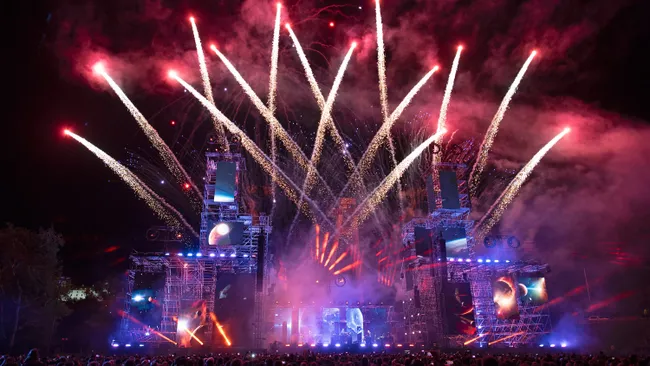Starmus 2024, Bratislava festival, science and music festival, Jean Michel Jarre, Brian May, Jane Goodall, Sylvia Earle, Stephen Hawking Medal, planet Earth, environmental science, space exploration, AI future, Bratislava events
“Explore the highlights of Starmus 2024, a unique festival in Bratislava that united scientists, musicians, and enthusiasts to celebrate and protect our planet. Featuring inspiring talks from Jane Goodall and Sylvia Earle, electrifying performances by Jean Michel Jarre and Brian May, and insights into the future of AI and space exploration, Starmus 2024 was an unforgettable experience.”

The Starmus International Festival, a renowned event for science enthusiasts worldwide, made its grand return in 2024, captivating attendees with a unique blend of art, music, and science. This year, Bratislava, Slovakia, played host to the festival from May 12 to May 17, where the theme “The Future of Our Home Planet” took center stage. Over the course of a week, more than 50 prominent experts in climate change, environmental science, artificial intelligence, and cybersecurity gathered to share their knowledge and inspire action.
The festival kicked off with a spectacular performance by electronic music pioneer Jean Michel Jarre, featuring legendary Queen guitarist Brian May. The concert was an audiovisual feast, combining futuristic laser light shows, wild pyrotechnics, and captivating visual graphics with Jarre’s iconic soundtrack. It set the tone for the days to come, promising an unforgettable experience for all attendees.
The following day, the legendary primatologist and anthropologist Jane Goodall inaugurated the festival with an emotional speech about our beautiful blue planet and the preciousness of life. She emphasized the importance of hope while calling for urgent action to mitigate the irreversible damage humanity is causing to the environment. Goodall’s heartfelt words resonated deeply with the audience, setting a reflective and inspiring tone for the festival.
World-renowned scientists, researchers, and former astronauts followed Goodall’s lead, each bringing their unique perspectives on the challenges and opportunities facing our planet. Among them was oceanographer Sylvia Earle, whose presentation on the vast oceans and the life dwelling in the deep left a lasting impression. Over her 50-year career, Earle has spent thousands of hours underwater and published over 100 scientific papers. As the first woman to serve as chief scientist at the National Oceanic and Atmospheric Administration (NOAA), her dedication to the oceans and her ability to convey their marvels is truly commendable. Earle illustrated the wonders of the oceans and emphasized how much we still have to learn about some of the deepest parts of our own planet.
Unlike previous editions of Starmus, which often focused on exploring worlds beyond our own, this year’s festival was unique in its primary focus on planet Earth. As Earle aptly noted, “Earth is part of space, it just happens to be here.” This perspective underpinned the festival’s broader narrative, bridging the gap between the cosmos and our home planet.
One of the festival’s highlights was the Stephen Hawking Medal of Science Communication award ceremony, held on the third day. Sylvia Earle was among the recipients, alongside artist Laurie Anderson, filmmaker Christopher Nolan, and presenter and author Sir David Attenborough. The Stephen Hawking Medal is awarded to individuals and teams who have made significant contributions to science communication across four categories: Music & Arts, Science Writing, Films & Entertainment, and Lifetime Achievement. The ceremony, hosted by comedian and writer Robin Ince, also featured performances from Tony Hadley, former lead singer of Spandau Ballet, keyboardist and composer Rick Wakeman, and astrophysicist and former Queen guitarist Brian May. The night culminated in an energetic set from the iconic punk-rock band The Offspring, adding a vibrant musical note to the celebration of scientific excellence.
Midway through the festival, an epic ‘star party’ was held within the towering ruins of Devin Castle. That night, guests mingled amidst exquisite food, music, and, of course, telescopes. The breathtaking views of the moon, nebulas, and distant galaxies from the Slovakian countryside offered a mesmerizing experience. The Ring Nebula, with its delicate blues, oranges, and reds, stood out as a highlight, dazzling observers with its vibrant colors.
As the week progressed, the focus shifted from environmental and Earth science to the future of AI and space exploration. Former Canadian Space Agency astronaut Chris Hadfield presented an enlightening talk on space junk and efforts to solve the debris problem. He was followed by former NASA astronaut Garrett Wiseman, who spoke about SpaceX’s strides in human spaceflight, with ambitious plans targeting the moon and Mars.
Astrophysicist Martin Rees provided a contrasting perspective, advocating for robotic exploration over human spaceflight in his talk “Post-human Intelligence — A Cosmic Perspective,” delivered via video link. Rees emphasized that government organizations like NASA and ESA should prioritize robotic missions while leaving human spaceflight to private astronauts.
The festival concluded with physicist Brian Greene’s captivating presentation, “Until the End of Time.” Using stunning graphics and visual imagery, Greene took the audience on a journey through the cosmos and into the distant future, exploring the ultimate fate of the universe.
Complementing the main festival, the Starmus Camp and City Program brought science and music to the streets of Bratislava. Morning talks, presentations, and screenings in Hlavné námestie, the city’s main square, were open to the public for free. Twelve booths featuring science exhibitions, panel discussions, and a music program made science accessible and engaging for everyone.
Starmus 2024 in Bratislava was a resounding success, uniting scientists, musicians, and enthusiasts in celebration of planet Earth. The festival not only highlighted the pressing issues facing our planet but also showcased the incredible potential of science and the arts to inspire change and foster a deeper appreciation for the world we inhabit.
Read More-